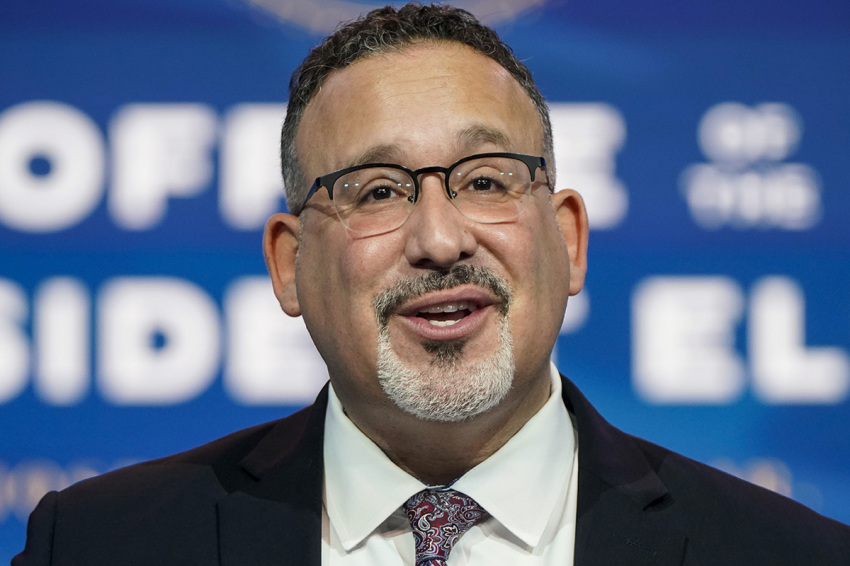Biden Dept. of Education: It was an ‘error’ to push CRT activist handbook

The Biden administration’s Department of Education has edited its “Roadmap to Reopening Safely and Meeting all Students’ Needs,” which previously included a link to a document promoting tenets of critical race theory.
The Department of Education’s COVID-19 handbook was originally published in April as a “resource for states, districts, schools, and teachers as they reopen schools safely and support students.” It also informed the aforementioned groups on how they could spend money allotted for education in the American Rescue Plan passed by Congress and signed into law by President Joe Biden in March.
The handbook contains a section declaring that: “Schools are microcosms of society; therefore, culturally responsive practices, intentional conversations related to race and social and emotional learning, and helping students understand the skills they are building in school, are the foundation for participating in a democracy and should be anchor tenets in building a schoolwide system of educational opportunity.”
The original copy of that particular section of the handbook, captured in a July 15 screenshot, included a hyperlink to the Abolitionist Teaching Network’s “Guide for Racial Justice & Abolitionist Social and Emotional Learning.” While Fox News first reported on the guide’s inclusion in the handbook earlier this week, a New York Post article highlighted its presence in the publication nearly two months ago.
In the guide, the Abolitionist Teaching Network describes its mission as to “develop and support educators to fight injustice within their schools and communities.” The guide featured a call to “abolitionist teachers” to “build a school culture that engages in healing and advocacy,” which “requires students, families, and educators who disrupt Whiteness and other forms of oppression.”
Critics of the Biden administration alleged that by promoting the Abolitionist Teaching Network’s guide, the Department of Education was endorsing critical race theory.
Encyclopedia Brittanica defines critical race theory as “an intellectual movement and loosely organized framework of legal analysis based on the premise that race is not a natural, biologically grounded feature of physically distinct subgroups of human beings but a socially constructed (culturally invented) category that is used to oppress and exploit people of colour.”
Following Fox News' report and the resulting pushback, the Department of Education issued a statement to the news outlet asserting: “The Department does not endorse the recommendation of this group, nor do they reflect our policy positions.” Additionally, the department maintained that “it was an error in a lengthy document to include this citation.”
In addition to asking teachers to “disrupt Whiteness,” the Abolitionist Teaching Network’s guide characterizes social-emotional learning as “a covert form of policing used to punish, criminalize, and control Black, Brown, and Indigenous children and communities to adhere to White norms.”
The document also laments that “Most SEL standards are rooted in Eurocentric norms, not to empower, love, or free Black, Brown, or Indigenous children.”
After pressing for the removal of “all punitive or disciplinary practices that spirit murder Black, Brown, and Indigenous children,” the guide concludes with a list of an “Abolitionist Teacher’s Demands,” which contains demands to “remove any and all police and policing from schools” and institute “reparations for children of color stolen by the school-to-prison pipeline.”
The inclusion of the Abolitionist Teaching Network’s Guide for Racial Justice & Abolitionist Social and Emotional Learning is not the first time the Department of Education has had to walk back encouragement of critical race theory.
Earlier this year, the department introduced the National Activities program as part of an effort to “promote new and existing evidence-based strategies to encourage innovative American history, civics and government, and geography instruction, learning strategies, and professional development activities, and programs” for school personnel.
The National Activities program is an initiative of the American History and Civics Education programs, which provide grants to educational institutions that embrace the aforementioned types of initiatives.
The department stressed that the goal of such programs was to “benefit low-income students and underserved populations,” identifying the integration of “projects that incorporate racially, ethnically, culturally, and linguistically diverse perspectives into teaching and learning” as a priority. It specifically mentioned “the importance of, in the teaching and learning of our country’s history, both the consequences of slavery, and the significant contributions of Black Americans to our society.”
According to the department, “This acknowledgment is reflected, for example, in the New York Times’ landmark ‘1619 Project’ and in the resources of the Smithsonian’s National Museum of African American History.” The document from the Federal Register outlining the National Activities Program includes a quote from Ibram X. Kendi, a noted proponent of critical race theory.
In response to the criticism that followed the agency’s promotion of projects and individuals that promote critical race theory, Secretary of Education Miguel Cardona said in a statement last week that “this program, however, has not, does not, and will not dictate or recommend specific curriculum be introduced or taught in classrooms.”
Efforts to ban the teaching of critical race theory in public schools have gained a lot of steam at the state level. According to Education Week, “26 states have introduced bills or taken other steps that would restrict teaching critical race theory or limit how teachers can discuss racism and sexism,” while “eleven states have enacted those bans, either through legislation or other avenues.” The states that have enacted such legislation are Arizona, Florida, Georgia, Iowa, Montana, New Hampshire, Oklahoma, South Carolina, Tennessee, Texas and Utah.
At the federal level, legislation banning the teaching of critical race theory in taxpayer-funded schools faces an uphill battle to passage in light of the Democrats’ control of the Legislative and Executive branches of government.
However, Sen. Tom Cotton, R-Ark., and Rep. Dan Bishop, R-N.C., have introduced legislation in their respective chambers called the Stop CRT Act, which would “bar federal funds from being sent to K-12 schools that promote Critical Race Theory, as well as colleges and universities that compel students or faculty to affirm tenets of Critical Race Theory.”
Ryan Foley is a reporter for The Christian Post. He can be reached at: ryan.foley@christianpost.com



























